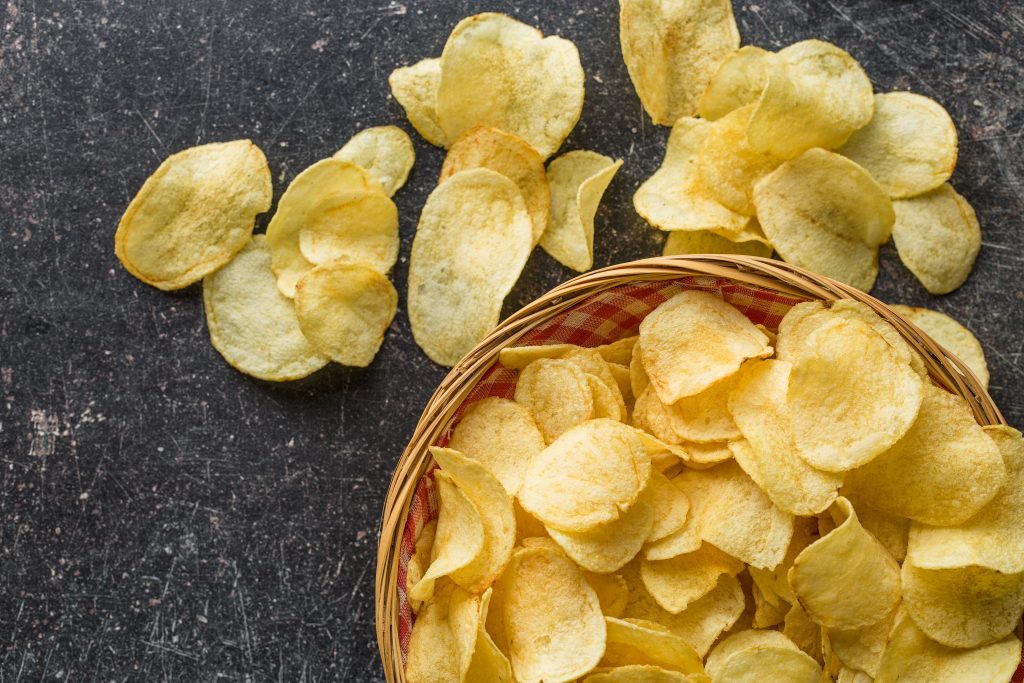Advertisement
Love by the Bagful
Enjoying food without chipping away at your self-esteem

I have a chip problem. I try (sometimes weekly) to enter into a reasonable, long-term relationship with a family-sized bag of All-Dressed Ruffles. Yet, I find that after 20 minutes or so, it has already left me. Never so much as an explanation. Such a salty method of handling a breakup.
Food is inescapable. No other life necessity so closely aligns itself with our well-being and our distress, our celebrations, and our grievances. We spoil ourselves with it, or we deny ourselves until it spoils on its own. (Generally, because the tub of yogurt had its front-of-shelf position usurped by the more celebrated salsa.)
Food is also meaningful. It is a friend when we are lonely; it is revenge when we are hurt; it is even occasionally (sorry, peas) a compress when we are injured.
Ann Kerr is a psychotherapist and occupational therapist at Toronto’s The Clinic on Dupont. She explains that not only is food a necessity, but it can also be a mechanism for emotional healing.
“It’s a wonderful sensory experience. It’s a very social experience. And, we have to eat … If people are feeling very troubled or anxious [food] can also be a big distraction; it resets them … Some people depend on that to kind of cope.”
Potato chips are my coping mechanism. But, like so many of us, my struggle is with portion control. Prior to 1926, the only way to purchase potato chips was from a shopkeeper, who scooped them from a larger barrel (imagine: a barrel of chips!) into a sensibly sized bag.
How much is too much? Please, don’t make me count individual chips or use a protractor to determine my cutting angle for cake. (What if it’s a loaf? There are no angles!)
Kerr says we are already well-equipped to self-manage. Nature awarded us with an appetite. We should stop eating when … wait for it: “You feel full.”
“You have good satiety cues and all of a sudden you just don’t want any more. It’s either too sweet, too salty, too fatty, or too much,” says Kerr. Your body will tell you that.
It’s also helpful to tune out others. My sister, Heidi, confesses that she has her own food issues, many of which were triggered by our mother.
“She used to make a comment (to me), ‘You’re not overweight, you’re just under-tall.’ She used to say these things when I was coming back from the pediatrician’s office. I must have internalized that to a certain degree.”
Heidi found balance through yoga, golf, and giving herself permission to enjoy food again. For her, that was a decades-long process. A real long-term relationship.
February makes balance especially difficult. The cold hand of winter urges me to warm my fingers by wrapping them around a forkful of pasta.
Leslie Beck is a registered dietitian and director of nutrition at Medcan, a Canadian health and wellness company. She not only says it’s healthy to enjoy those starchy February meals but also explains that biology pushes us to do just that.
“Winter food cravings are linked to levels of serotonin, a brain chemical that improves mood, reduces your appetite, promotes sleep, etc. Research has found that our brain’s production of serotonin is lowest in the winter months … Carbohydrates are important; they help to balance serotonin levels in the brain, and it’s just a matter of having the right size [servings].”
Beck also stresses the importance of being kind to yourself. A piece of cake? An extra dessert? If the occasion calls for it, she says, “Do it. Because if you decide to give yourself permission, you’re less likely to overeat. You’ll have it; you’ll enjoy it.
“Whereas if you go into something saying, ‘I can’t, I shouldn’t, this really isn’t part of my plan’ … Then you end up eating more than you wanted to. You feel guilty, you beat yourself up, and it’s harder to get yourself back on track with the next meal or the next day.”
I must accept I am married to my <love> for chips, but I must restrict myself to dating them only occasionally, and only a few at a time. And to never be alone with them on a sofa with nobody else around, lest they take advantage of me.
Now, where is that yoga mat?
Timing is everything
All of these steps will reduce stress and provide comfort:
- Embrace routine: it’s very healthy.
- Meals are three times per day—no skipping.
- Allow yourself regular snacks and tea breaks.
- Keep up a healthy sleep schedule
- And add exercise.





